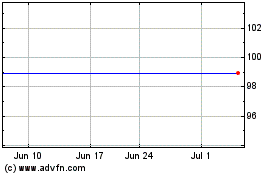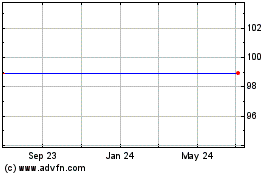By Thomas Gryta, John D. McKinnon and Keach Hagey
AT&T Inc. Chief Executive Randall Stephenson made an $85
billion wager last month that would turn the giant telephone
company into one of the world's biggest media companies by
swallowing Time Warner Inc.
The same day, Donald Trump told supporters in Gettysburg, Pa.,
he would block the deal if elected president. "It's too much
concentration of power in the hands of too few," he said, calling
the merger "an example of the power structure I am fighting."
Few companies had more at stake in the presidential election
than AT&T, which expected Hillary Clinton to be in the White
House, said one former AT&T executive in Washington. Other
businesses in a similar position are watching to see if the merger
survives a still-undefined Trump administration.
For the telecom industry, Mr. Trump could usher in an era of
deregulation, a change from what many companies viewed as a
strong-arm era under President Barack Obama. Yet Mr. Trump's talk
on the campaign trail about crushing the AT&T deal has left
executives, lobbyists, bankers and others wondering what his view
will be from the White House.
The company has one of the largest lobbying operations in
Washington -- spending $16 million last year -- though the strength
of such connections might not translate to the new world.
Investors have been skeptical from the start, even when polls
showed Mrs. Clinton likely to win, because of questions about
regulatory hurdles and opposition from advocacy groups and rivals.
On Wednesday, Time Warner's shares were trading at 17% below the
value of the offer.
AT&T executives and advisers remain confident about getting
the blockbuster deal through, said people familiar with the matter,
though they are shifting tactics and awaiting Mr. Trump's cabinet
appointments. One consultant who works with AT&T said Mr.
Trump's criticism of the deal sounded like a "throwaway
comment."
"We support president-elect Trump's agenda of economic growth,
investment in infrastructure and rational regulation," Mr.
Stephenson said Wednesday in a written statement. "We look forward
to presenting how our Time Warner transaction supports that agenda
for the benefit of consumers."
Time Warner declined to comment.
Since his election win, Mr. Trump hasn't spoken publicly about
the AT&T transaction, which would put CNN, HBO and the Warner
Bros. studio under the same corporate roof as AT&T's 90 million
retail wireless customers and 25 million pay-TV subscribers.
A spokesman for the Trump transition team didn't have an
immediate comment.
Unknown is whether the Federal Communications Commission will
have jurisdiction and, more broadly, whether Mr. Trump will pull
back from his campaign rhetoric, as he has appeared to do on a
handful of other issues.
While Mr. Trump won't have the power to veto the deal, its
success may rest on the antitrust views of his nominees for
attorney general and Justice Department antitrust chief. He will
also get to appoint the head of the FCC.
Mr. Trump, who is now assembling his administration, has sent
conflicting signals about telecom and media regulation.
Former New York Mayor Rudy Giuliani said at The Wall Street
Journal CEO Council meeting this week that the Trump administration
would have a traditional Republican approach to the antitrust
division, similar to the Bush and Reagan administrations. "The last
thing in the world you are going to see is an antibusiness
administration," he said. (The original AT&T was broken up
under the Reagan administration.)
In the aftermath of the election, the focus has been on Jeffrey
Eisenach, a consultant and free-market economist who was leading
Mr. Trump's policy-transition team on telecom issues. He has
expressed a deregulatory stance in the past, including opposition
to the FCC's net-neutrality rules that require all internet traffic
to be treated equally. He didn't respond to requests for
comment.
"The notion that all Republicans are complete laissez-faire when
it comes to antitrust policy I don't think is accurate," Mr.
Eisenach said on C-Span in October. There would be support, he
said, for "a less intrusive FCC more focused on enforcing rules and
less focused on writing new ones."
Within the telecom giant, there is concern over the deal's fate,
according to the people familiar with the matter. The company
miscalculated by announcing its deal weeks before the election,
these people said.
AT&T received the blessing of regulators for its nearly $50
billion takeover of DirecTV last year. But it failed to buy rival
T-Mobile in 2011 after resistance from regulators. AT&T has
argued the Time Warner deal, which wouldn't combine two
competitors, isn't comparable to T-Mobile.
Mr. Trump's criticism of mainstream media -- especially CNN,
which is owned by Time Warner -- is another wild card in the
regulatory review process, people close to AT&T said.
Consultants and lobbyists close to AT&T said they viewed Mr.
Trump's comments as a criticism of CNN's coverage, rather than
opposition to the deal. Mr. Trump has accused CNN and other news
media of bias, inaccurate coverage and of not understanding the
views of his supporters. During the campaign, he often referred to
CNN on Twitter as the "Clinton News Network."
CNN President Jeff Zucker has defended the network's election
coverage. In the days after the deal was announced, Mr. Stephenson,
the AT&T chief, promised to safeguard CNN's editorial
independence.
Time Warner executives aren't panicked about Mr. Trump's pledge
to block the merger, believing that antitrust law is on their side,
according to people familiar with the company.
"The deal wasn't predicated on who would be in the White House
in 2017," said David McAtee, AT&T's general counsel. "It was
predicated on the law and the facts."
Mr. Stephenson said in an interview after the deal was announced
that it shouldn't be blocked by the government because the
businesses don't overlap.
Pantelis Michalopoulos, a partner at Steptoe & Johnson LP
who heads the firm's telecom practice and has worked on getting
similar deals approved, said favoring small government isn't
necessarily inconsistent with a tough antitrust stand, citing Teddy
Roosevelt.
"The preference of more traditional conservatives for less
regulation appears to clash with another instinct -- the mistrust
of too much power in the hands of too few incumbents," he said.
In a written statement after the AT&T deal, Mr. Trump's
campaign also made a reference to Mr. Roosevelt's trustbusting and
said as president Mr. Trump would "break up the new media
conglomerate oligopolies."
AT&T and its executives learned firsthand the power of
government influence, particularly under Democrats. In addition to
abandoning its T-Mobile takeover, AT&T fought and lost against
the Obama administration's sweeping net-neutrality rules, which
govern the flow of internet traffic.
For much of this year, the company took steps to curry favor
with what executives expected would be a Clinton
administration.
AT&T's top lobbyist, Jim Cicconi, planted himself in the
Clinton camp this summer with an endorsement in June. Mr. Cicconi,
who has since retired, said in a statement at the time he had
backed every Republican presidential candidate since 1976, but
feared Mr. Trump "would set our nation on a very dark path."
Company employees chipped in substantial amounts to Mrs. Clinton
-- about $289,000 -- compared with less than $22,000 for Mr. Trump,
according to the Center for Responsive Politics, a nonpartisan
group that collects data on political contributions and
spending.
Before the Nov. 8 election, AT&T considered submitting its
merger plan to a Democratic-led FCC and Justice Department, said
people familiar with the matter. Now, it might seek to avoid FCC
review by jettisoning Time Warner's airwave licenses.
An FCC review, which focuses on whether the deal is in the
public interest, would subject the deal to broader and potentially
tougher scrutiny than the Justice Department's antitrust
review.
While a negative decision from the Justice Department could be
fought in court, the FCC can essentially block the deal by placing
a lengthy, complex review in the hands of an administrative law
judge. The agency moved to do that when Comcast Corp. tried and
failed to buy Time Warner Cable last year, and during AT&T's
unsuccessful bid for T-Mobile in 2011.
Mr. Trump's selection of Republican National Committee Chairman
Reince Priebus as his chief of staff was "reassuring to a lot of
people," said a person familiar with AT&T's thinking.
But selection of Steve Bannon as Mr. Trump's special counsel was
a question mark. Mr. Bannon ran Breitbart News Network, a media
outlet that promoted nationalist, anti-immigrant and
antiestablishment views, before joining the Trump campaign in
August.
"If the facts and the law are followed, the deal should get
approved," said Robert McDowell, a Republican former FCC
commissioner.
Others aren't so sure. Michael Copps, a former Democratic FCC
commissioner, said there remained too much guesswork regarding Mr.
Trump's plans, even though he personally believes it concentrates
too much power in the hands of one company. "Every morning is a
surprise,' he said.
--Dana Mattioli and Sarah Rabil contributed to this article.
Write to Thomas Gryta at thomas.gryta@wsj.com, John McKinnon at
john.mckinnon@wsj.com and Keach Hagey at keach.hagey@wsj.com
(END) Dow Jones Newswires
November 17, 2016 02:47 ET (07:47 GMT)
Copyright (c) 2016 Dow Jones & Company, Inc.
Time Warner (NYSE:TWX)
Historical Stock Chart
From May 2024 to Jun 2024

Time Warner (NYSE:TWX)
Historical Stock Chart
From Jun 2023 to Jun 2024
